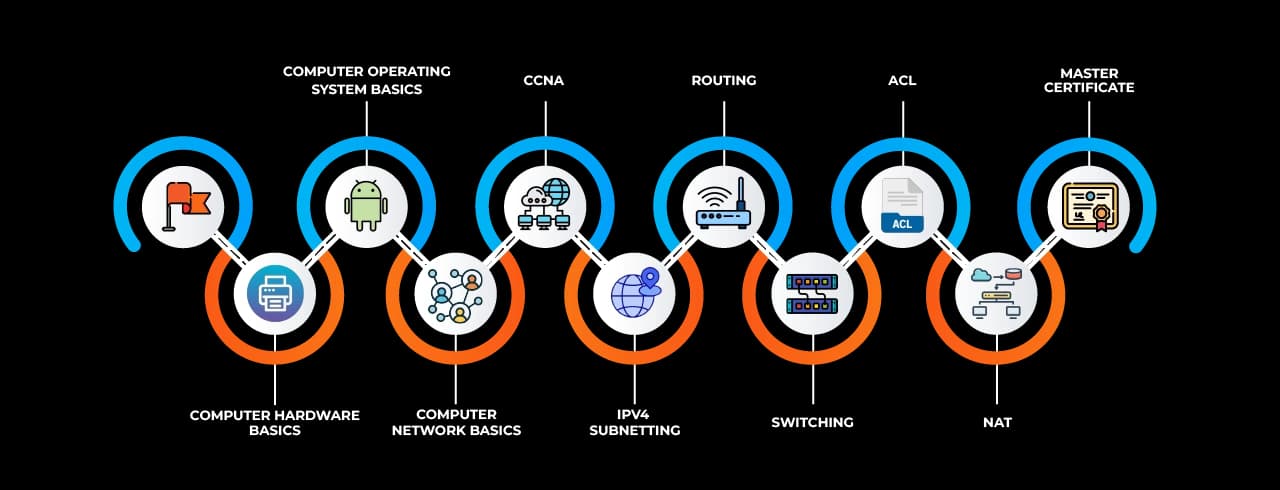CCNA Classes in Ahmedabad
 Enroll In CCNA Course And Gain Hands-On Skills In Networking And It Infrastructure
Enroll In CCNA Course And Gain Hands-On Skills In Networking And It Infrastructure Get Ready To Tackle Complex Networking Challenges With Confidence
Get Ready To Tackle Complex Networking Challenges With Confidence Get Expert-Led Sessions And Real-World Simulations That Prepares You
Get Expert-Led Sessions And Real-World Simulations That Prepares You
CONSULT WITH
OUR ADVISORS
- Course & Curriculum Details
- Flexible Learning Options
- Affordable Learning
- Enrollment Process
- Career Guidance
- Internship Opportunities
- General Communication
- Certification Benefits
Request Call Back
Learning Curve for CCNA in Ahmedabad

Why Choose SevenMentor CCNA in Ahmedabad
Empowering Careers with Industry-Ready Skills.
Specialized Pocket Friendly Programs as per your requirements
Live Projects With Hands-on Experience
Corporate Soft-skills & Personality Building Sessions
Digital Online, Classroom, Hybrid Batches
Interview Calls Assistance & Mock Sessions
1:1 Mentorship when required
Industry Experienced Trainers
Class Recordings for Missed Classes
1 Year FREE Repeat Option
Bonus Resources
Specialized Pocket Friendly Programs as per your requirements
Live Projects With Hands-on Experience
Corporate Soft-skills & Personality Building Sessions
Digital Online, Classroom, Hybrid Batches
Interview Calls Assistance & Mock Sessions
1:1 Mentorship when required
Industry Experienced Trainers
Class Recordings for Missed Classes
1 Year FREE Repeat Option
Bonus Resources
Fastest 1:1 doubt support
Flexible EMI Plans
Adaptive LMS
Free Wifi Facilities
Flexible Scheduling
Ongoing Career Support
Placement Drives
GitHub Project Implementations
Real World Topics
5/5 rating for 99% doubt Solutions
Be Different With Master Certificate
Latest Market Technology & Practical Training
Resume Building Session & Job Portals Training
Enhanced Capstone Projects for learning
Stand Out with an impressive Certificate
Weekday and Weekend Batches
Workshops & Seminars with Industry Experts
Unlimited Interview Calls
AWS Cloud Project Deployments
Live Quizzes
Resolve doubts any time through chat, voice notes, calling or meeting with instructors.
Curriculum For CCNA in Ahmedabad
BATCH SCHEDULE
CCNA in Ahmedabad Course
Find Your Perfect Training Session
Feb 15 - Feb 21
2 sessionsFeb 22 - Feb 28
1 sessionsMar 1 - Mar 7
1 sessionsLearning Comes Alive Through Hands-On PROJECTS!
Comprehensive Training Programs Designed to Elevate Your Career
No active project selected.
Transform Your Future with Elite Certification
Add Our Training Certificate In Your LinkedIn Profile
Our industry-relevant certification equips you with essential skills required to succeed in a highly dynamic job market.
Join us and be part of over 50,000 successful certified graduates.

Course Content
Frequently Asked Questions
Everything you need to know about our revolutionary job platform
What is covered in the CCNA Course at SevenMentor Institute?
What tools will I learn in the CCNA Course?
How does SevenMentor's CCNA Certification help in career growth?
Does this CCNA Course include hands-on training with Cisco devices?
What makes SevenMentor’s CCNA Classes unique?
Will I work on live projects during the CCNA course?
What skills will I gain from SevenMentor’s CCNA Course?
What career roles can I pursue after completing SevenMentor’s CCNA Course?
Is the CCNA Certification recognized globally?
How does CCNA Training at SevenMentor prepare me for the CCNA exam?
Does the CCNA Course at SevenMentor include network security concepts?
How is troubleshooting covered in the CCNA Certification course?
What routing and switching concepts are taught in SevenMentor’s CCNA Course?
How does SevenMentor Institute ensure practical learning in the CCNA Training?
Does this CCNA Course include training on wireless networks and technologies?
What is the career scope after completing the CCNA Certification?
Can I join the CCNA course without any prior networking knowledge?
Does the CCNA Training include exam preparation and practice tests?
Are the CCNA trainers at SevenMentor certified and experienced?
How long does it take to complete the CCNA Course at SevenMentor?
Explore Other Demanding Courses
No demanding courses available at the moment.
Debug: courses prop type: object, isArray: yes, length: 0




